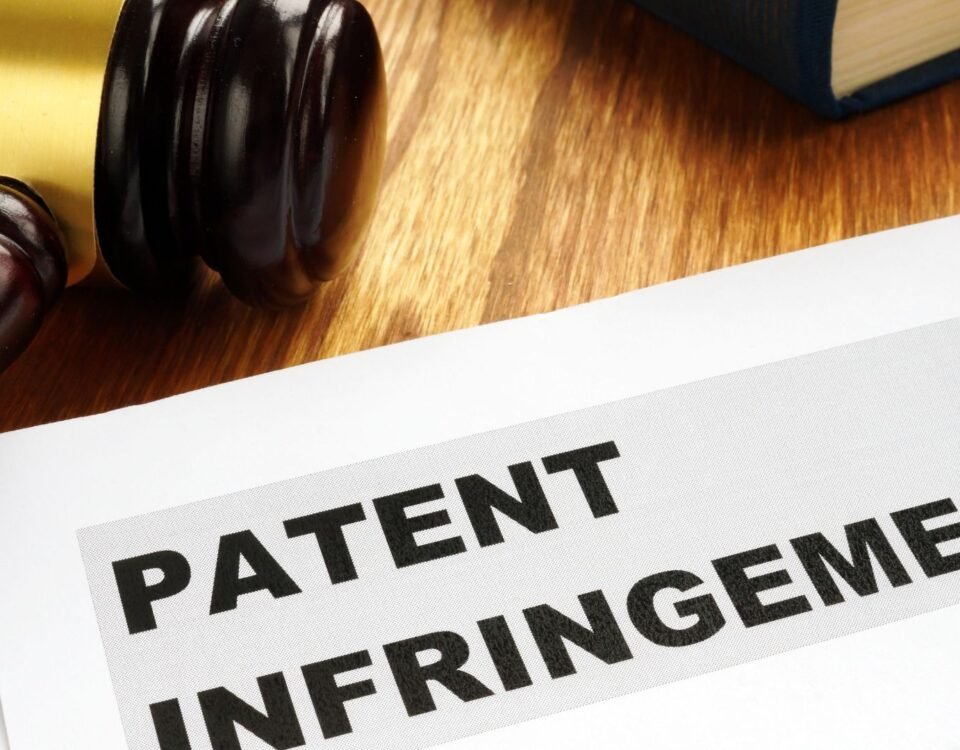
Amazon Holding Funds for 90 Days: What You Need to Know
13 January 2024
How to Sell Supplements on Amazon (+ What Mistakes To Avoid)
13 January 2024As an Amazon seller, you may encounter intellectual property complaints from brand owners.
These complaints can have serious implications for your seller account, potentially leading to suspension or even business shutdown.
It is crucial to understand the importance of addressing these complaints and taking immediate action to protect your account.

Key Takeaways:
- Ignoring intellectual property complaints on Amazon can result in account closure.
- Understanding the nature of IP complaints is essential to resolving them effectively.
- IP complaints can lead to listing or account suspensions.
- Identifying potential IP complaints can help sellers take proactive measures.
- Responding professionally and promptly to IP complaints is crucial.
Understanding Amazon IP Complaints
An Amazon IP complaint refers to a brand’s request to stop a seller from using their intellectual property on the platform.
These complaints can be related to trademarks, copyrights, or patents. It is important for sellers to recognize the seriousness of IP complaints and take appropriate measures to resolve them.
IP complaints can lead to listing suspensions or even account suspensions if not addressed properly.
When a brand submits an IP complaint to Amazon, it is because they believe a seller is infringing on their intellectual property rights.
Brands have the right to protect their creations and ensure that others do not profit from their ideas without permission.
As an Amazon seller, it is essential to understand the implications of IP complaints and the potential consequences they can have on your business.
IP complaints can arise due to various reasons, such as using a brand’s logo without authorization, selling counterfeit or unauthorized products, or violating copyright laws.
It is crucial for sellers to familiarize themselves with intellectual property laws and regulations to avoid unintentional infringement.
Resolving IP complaints requires prompt action and effective communication. Sellers should carefully review the complaint, understand the specific allegations made by the brand, and take necessary steps to address the issue.
Ignoring or mishandling IP complaints can result in severe penalties, including the suspension or deactivation of your Amazon seller account.
To better understand the nature of IP complaints on Amazon, let’s look at a detailed comparison of trademarks, copyrights, and patents:
| Intellectual Property Type | Description |
|---|---|
| Trademarks | A symbol, word, or phrase that represents a brand or its products. It distinguishes a brand from its competitors and provides legal protection against unauthorized use. |
| Copyrights | Protection granted to original works of authorship, such as books, music, artwork, or software. It gives the creator exclusive rights to reproduce, distribute, and display their work. |
| Patents | Legal protection for new inventions or unique processes. Patents grant inventors exclusive rights to their inventions, preventing others from making, using, or selling their patented products without permission. |
Understanding the specific type of IP complaint lodged against you will help you formulate an appropriate response.
It is crucial to take IP complaints seriously and address them promptly to protect your reputation as a seller and maintain a good standing on the Amazon platform.
By demonstrating your commitment to respecting intellectual property rights, you can minimize the risk of future IP complaints and ensure the success and longevity of your business on Amazon.

Impact of IP Complaints on Amazon Accounts
IP complaints on Amazon can have a significant impact on your seller account.
While a first-time IP claim may result in a listing suspension, repeated IP claims can lead to account suspension, jeopardizing your business on the platform.
It is crucial to understand the potential consequences of IP complaints and take proactive steps to prevent them.
Responding promptly and professionally to IP complaints is essential for maintaining a good standing on Amazon.
Consequences of IP Complaints
When an IP complaint is filed against your Amazon account, it can result in various repercussions:
- Listing Suspension: A first-time IP claim can lead to the suspension of the specific listing associated with the complaint, preventing you from selling that particular product.
- Account Suspension: Repeated IP claims or unresolved IP complaints can escalate to an account suspension, restricting your access to the entire platform.
Understanding the impact of IP complaints on your Amazon account is crucial for safeguarding your business and ensuring long-term success as a seller.
As an illustration of the potential consequences of IP complaints, consider the following table:
| IP Complaint | Consequences |
|---|---|
| First-time IP claim | Listing suspension |
| Repeated IP claims | Account suspension |

Identifying Potential IP Complaints
As an Amazon seller, it is crucial to be proactive in identifying potential intellectual property (IP) complaints to protect your seller account.
By monitoring specific signs, you can stay ahead and minimize the risk of facing IP-related issues. Here are some key indicators to keep in mind:
Brand as the Sole Seller or Limited Competition
If you notice a product listing with only the brand itself as the seller or limited competition, it may be a red flag for potential IP complaints.
Brands are more likely to monitor their own listings closely and act upon any perceived IP infringement.
Exercise caution when dealing with such brands and ensure you are adhering to their guidelines and license agreements.
Review Counts of Other Sellers
Checking the review counts of other sellers on a product listing can provide valuable insights into the likelihood of IP complaints.
If you see that other sellers have received IP complaints or negative reviews related to IP infringement, it may indicate a higher risk of facing similar issues.
Take note of this information and take necessary precautions when dealing with that particular brand or product.
Use IP Alert Tools
Utilizing tools such as IP Alert can help you stay informed about brands known for issuing IP complaints.
These tools can provide you with valuable data and alerts about IP-related issues, enabling you to exercise extra caution when engaging with specific brands.
Stay up to date with the latest developments in the IP landscape to minimize the risk of facing unwarranted complaints.
By being vigilant and proactive in identifying potential IP complaints, you can take necessary measures to protect your seller account and mitigate the impact of such complaints.
Keep these signs in mind when navigating the Amazon marketplace.
Responding to IP Complaints
When you receive an IP complaint, it is crucial to respond promptly and professionally to address the issue.
By taking the right steps, you can resolve IP claims and protect your seller account on Amazon.
Contact the Brand Owner
Your first course of action should be to reach out to the brand owner who filed the complaint.
Communicating with the brand owner allows you to understand the basis of the complaint and potentially find a resolution that satisfies both parties.
Keep your tone respectful and aim to establish a cooperative dialogue.
Respond to Amazon’s Notifications
Alongside contacting the brand owner, it is important to respond to any notifications you receive from Amazon regarding the IP complaint.
Amazon will provide instructions on how to address the claim, such as submitting a plan of action or providing proof of purchase or authorization to use the intellectual property in question.
Be sure to carefully read and follow Amazon’s guidelines to ensure a thorough response.
Effective Communication is Key
Resolving IP complaints successfully requires effective communication with both the brand owner and Amazon.
Maintain professionalism in all your interactions and provide any relevant information or documentation requested.
By promptly responding and cooperating, you demonstrate your commitment to resolving the issue and protecting your seller account.
| Key Steps | Description |
|---|---|
| Contact Brand Owner | Initiate a dialogue with the brand owner who filed the IP complaint to understand the basis of the claim and explore a possible resolution. |
| Respond to Amazon’s Notifications | Reply to any notifications received from Amazon regarding the IP complaint. Follow their instructions and provide the requested information or documentation. |
| Maintain Professionalism | Keep all communications with the brand owner and Amazon professional and respectful. Cooperate fully and follow through with any requests or actions needed to resolve the complaint. |
Avoiding IP Complaints in the Future
To prevent IP complaints in the future, it’s essential for sellers to be cautious when sourcing products from brands that are known for issuing IP complaints.
While Amazon doesn’t provide an official list of such brands, you can rely on research and insights from experienced sellers to identify potentially troublesome brands.
Researching brands before working with them is crucial for reducing the risk of receiving IP complaints.
Look for signs that a brand is stringent when it comes to protecting its intellectual property, such as a history of filing IP claims against sellers or limited competition in their product listings.
Additionally, staying updated on IP claim prevention strategies and adhering to Amazon’s policies and guidelines is vital.
By familiarizing yourself with Amazon’s Brand Registry and Intellectual Property Policy, you can ensure that you’re acting in compliance with the platform’s rules and regulations.
Here are some steps you can take to avoid IP complaints in the future:
- Conduct thorough research on brands before working with them
- Look for indicators of brands that frequently issue IP complaints
- Stay updated on Amazon’s policies and guidelines
- Familiarize yourself with IP claim prevention strategies
- Consider utilizing tools or services that provide insights into brand restrictions
By taking these proactive measures, you can significantly reduce the risk of facing IP complaints, protecting your seller account and ensuring long-term success on Amazon.

| Steps to Avoid IP Complaints | Benefits |
|---|---|
| Conduct thorough research on brands before working with them | Minimizes the risk of sourcing products from brands with a history of IP complaints |
| Look for indicators of brands that frequently issue IP complaints | Enables you to avoid brands with a high likelihood of filing IP claims |
| Stay updated on Amazon’s policies and guidelines | Ensures compliance with Amazon’s rules and regulations, reducing the risk of IP complaints |
| Familiarize yourself with IP claim prevention strategies | Equips you with the knowledge and tools to proactively prevent IP complaints |
| Consider utilizing tools or services that provide insights into brand restrictions | Helps you identify brands known for issuing IP complaints and avoid them altogether |
The Difference between IP Claims and Brand Restrictions
Understanding the distinction between IP claims and brand restrictions is crucial for Amazon sellers.
While these terms may seem similar, they have different implications for your seller account and the actions you need to take. Let’s explore the differences between IP claims and brand restrictions.
IP Claims
IP claims, also known as intellectual property claims, are allegations of intellectual property infringement made by brand owners.
These claims typically involve trademarks, copyrights, or patents. When a brand owner files an IP claim against you, they are accusing you of using their intellectual property without permission.
IP claims can result in serious consequences, including listing suspensions or even account suspensions if not addressed properly.
However, it’s important to note that a first-time IP claim may not necessarily lead to immediate account suspension. Amazon will assess the validity of the claim and your response before taking further action.

Brand Restrictions
Brand restrictions, on the other hand, are limitations imposed by Amazon on selling certain brands. These restrictions are not directly related to IP claims but are implemented by Amazon to protect brand owners’ interests.
The goal is to ensure that authorized sellers have control over their brand’s distribution and reputation on the platform.
When a brand is restricted, it means that only authorized sellers or specific sellers have the permission to sell those particular brands on Amazon.
As a seller, if you attempt to list or sell a restricted brand without authorization, you risk violating Amazon’s policies and facing consequences such as account suspension.
The Implications
Understanding the difference between IP claims and brand restrictions is essential because they have distinct implications for your seller account.
While a first-time IP claim may not lead to immediate suspension, repeated IP claims or violation of brand restrictions can result in account suspension.
It’s important to address IP claims promptly and professionally, working towards a resolution with the brand owner and providing necessary documentation to refute the claim.
Similarly, you should always abide by brand restrictions and avoid selling restricted brands without proper authorization.
By differentiating between IP claims and brand restrictions, you can better protect your seller account and maintain a solid presence on the Amazon platform.
| IP Claims | Brand Restrictions |
|---|---|
| Allegations of intellectual property infringement | Limitations on selling certain brands imposed by Amazon |
| Can lead to listing suspensions or account suspensions | Violating brand restrictions can result in account suspension |
| Require prompt and professional response | Must be followed to avoid policy violations |
Dealing with IP Claims vs Suspected IP Violations
As an Amazon seller, it is important to understand the difference between legitimate IP claims and suspected IP violations.
While both require attention, knowing how to handle each situation can help protect your account’s health and ensure compliance with Amazon’s policies.
Legitimate IP claims are complaints sent directly by Amazon or brand owners regarding the use of their intellectual property on the platform. These claims have account health implications and must be responded to promptly.
When you receive an IP claim, it is crucial to engage with the brand owner and address their concerns to resolve the issue.
Suspected IP violations, on the other hand, may not carry the same account health implications but should still be taken seriously. These violations can include potential infringements or violations that have not yet been reported by brand owners.
Although they may not result in immediate consequences, addressing suspected violations is necessary to maintain compliance with Amazon’s policies and mitigate any future risks.
To identify and handle IP claims or suspected violations, sellers should regularly check their Account Health section on Amazon.
This section provides valuable insights into any IP claims filed against your account and offers guidance on how to resolve them effectively.
By actively monitoring your Account Health, you can take proactive measures to protect your seller account.
Furthermore, it is essential to keep an open line of communication with both brand owners and Amazon when dealing with IP claims or suspected violations.
Clearly and professionally responding to any allegations and providing the necessary evidence can help resolve disputes and minimize the impact on your account’s health.
IP Claims vs Suspected IP Violations
| IP Claims | Suspected IP Violations |
|---|---|
| Received directly from Amazon or brand owners | Not reported by brand owners |
| Require prompt response | Should still be addressed to maintain compliance |
| Account health implications | Potential future risks |
| Engage with the brand owner | Take proactive measures to mitigate risks |
Potential Consequences of Ignoring IP Complaints
As an Amazon seller, it is crucial to take intellectual property (IP) complaints seriously and address them promptly.
Ignoring these complaints can have severe consequences for your business, potentially leading to account deactivation and default judgments.
When brand owners file lawsuits due to unresolved IP complaints, default judgments can be issued against sellers who fail to respond.
These binding court orders can result in significant legal repercussions, impacting your business and personal life.
In some cases, default judgments can even force you to attend court hearings in the brand owner’s home state, causing additional expenses and inconvenience.
It’s important to understand that IP issues transcend Amazon’s policies and guidelines. They enter the realm of legal matters, which must be handled with utmost care. By staying proactive and addressing IP complaints in a prompt and professional manner, you can avoid the potential consequences that come with ignoring them.
If you fail to respond to IP complaints, not only do you risk losing your Amazon seller account, but you also expose yourself to legal liabilities.
Protecting your business and reputation requires a proactive approach to resolving IP complaints and preventing them from escalating further.
Account Deactivation
Ignoring IP complaints can result in account deactivation, meaning you can no longer sell on Amazon.
This can have a devastating impact on your revenue, as well as your credibility as a seller.
Reinstating a deactivated account can be a complex and time-consuming process, requiring you to provide convincing evidence and proof of resolution to Amazon.
Default Judgment
If you fail to respond to a brand owner’s lawsuit resulting from an unresolved IP complaint, the court can issue a default judgment against you.
This means that the court will make a decision in favor of the brand owner without hearing your side of the story.
Default judgments can have far-reaching consequences, including financial penalties, product recalls, and even personal liability.
Protecting Your Business
To protect your seller account and your business from the consequences of ignoring IP complaints, it is crucial to promptly address any IP complaints you receive.
Responding professionally and providing evidence of resolution can help mitigate the risks associated with IP claims.
By taking proactive steps to prevent IP complaints and resolving them when they arise, you can safeguard your business and maintain a positive reputation on the Amazon platform.
Remember, addressing IP complaints is not just about compliance with Amazon’s policies; it’s about protecting your business from potential legal implications and ensuring its long-term success.
Taking Action to Protect Your Seller Account
Sellers often face the challenge of protecting their seller accounts when dealing with intellectual property (IP) complaints.
Taking immediate action is crucial to mitigate the potential risks and ensure the longevity of your business on Amazon.
Contact Brand Owners
When you receive an IP complaint, it’s essential to reach out to the brand owner involved.
Understanding the basis of the complaint and attempting to resolve the issue amicably can help prevent further escalation.
By establishing a line of communication, you demonstrate your willingness to address their concerns and find a mutually beneficial solution.
Respond to Amazon’s Notifications
Amazon will send notifications regarding IP complaints to your seller account.
It’s crucial to respond promptly and professionally to these notifications. Ignoring or delaying your response can negatively impact your account health and put you at higher risk of account suspension.
Complying with Amazon’s communication requirements shows your dedication to resolving the matter and protecting your seller account.
Provide Documentation or Evidence
When responding to IP complaints, it’s important to provide any necessary documentation or evidence to refute the claim.
This could include invoices, receipts, or other proof of purchase that demonstrates your compliance with intellectual property rights.
By presenting compelling evidence, you strengthen your case and increase your chances of having the complaint resolved in your favor.
Utilize Response Templates
Selling on Amazon involves handling a diverse range of issues, including IP complaints.
To streamline your response process, consider using response templates. These templates provide a structured format for addressing IP complaints efficiently and effectively.
Customize each template to suit the specific details of the complaint, while ensuring professionalism and adherence to Amazon’s guidelines.
Follow Amazon’s Guidelines for IP Complaint Removal
Amazon provides guidelines for handling IP complaint removal. Familiarize yourself with these guidelines and follow them closely when addressing IP complaints.
By aligning your response with Amazon’s requirements, you demonstrate your commitment to resolving the complaint and maintaining a trusted seller account.
By taking swift and appropriate action when faced with IP complaints, you actively protect your seller account and establish a reputation for addressing intellectual property concerns responsibly.
Emphasize open communication, use response templates, and comply with Amazon’s guidelines to showcase your dedication towards resolving IP complaints and safeguarding your business.
| Action Steps | Benefits |
|---|---|
| Contact brand owners | Build rapport and find resolution |
| Respond promptly to Amazon’s notifications | Protect account health and prevent suspension |
| Provide documentation and evidence | Strengthen your case and refute the claim |
| Utilize response templates | Efficiently address IP complaints |
| Follow Amazon’s guidelines | Show compliance and resolve complaints effectively |
Resources for Handling IP Complaints
As an Amazon seller, it’s important to have access to reliable resources and guidance when dealing with IP complaints.
Navigating through this complex issue requires expert assistance and support to ensure that you address complaints effectively and protect your seller account.
While the Amazon Seller Forums can be a source of information, it’s important to be cautious as the overwhelming amount of content may sometimes be misleading or outdated.
Instead, consider seeking guidance from professionals who specialize in handling IP complaints, such as the experienced team at Claimazon.
Claimazon offers expert guidance and assistance in navigating the complexities of IP complaints.
With their extensive knowledge and experience, they can provide valuable insights tailored to your specific situation.
By relying on reputable sources, you can ensure that you are well-informed and equipped to address IP complaints effectively.
They can provide you with the necessary strategies to protect your business and handle IP complaints with confidence.
Why Choose Claimazon for IP Claims?
- Specialized expertise in dealing with IP complaints on Amazon
- Proven track record of successfully resolving IP issues for sellers
- Customized strategies tailored to your specific case
- Quick and responsive support throughout the entire process
The Value of Expert Guidance
Seeking expert guidance ensures that you have access to a wealth of knowledge and experience.
By working with professionals, you can have peace of mind knowing that you are receiving accurate and up-to-date guidance. Claimazon’s expertise and support can help you address IP complaints efficiently, protect your seller account, and safeguard your business on the Amazon platform.
| Benefits of Expert Guidance | Importance |
|---|---|
| Accurate interpretation of Amazon’s policies | Ensures compliance and avoids missteps |
| Expertise in negotiating with brand owners | Increases the chances of resolving complaints amicably |
| Insights into effective communication with Amazon | Maximizes the chances of a favorable outcome |
| Guidance on safeguarding your seller account | Prevents potential account suspensions |
Having expert guidance during the IP complaint process can make a significant difference in protecting your seller account.
Take advantage of the resources available to ensure that you are well-equipped to handle IP complaints effectively and secure your business’s success on Amazon.
Frequently Asked Questions
Maybe you still have some questions about IP claims, so we’ll address them in the section below.
What are the consequences of receiving IP complaints on Amazon?
IP complaints on Amazon can lead to listing suspensions and even account suspensions if not addressed properly. Ignoring IP complaints can result in account closure and potential business shutdown.
How can sellers identify potential IP complaints on Amazon?
Sellers can monitor signs such as limited competition, the brand being the only seller, and checking review counts of other sellers. Tools like IP Alert can provide insights into the likelihood of IP complaints.
How should sellers respond to IP complaints on Amazon?
Sellers should first contact the brand owner to understand the basis of the complaint and try to resolve the issue. They must also respond to Amazon’s notifications and provide relevant information to address the IP claim.
How can sellers avoid future IP complaints on Amazon?
Sellers should be cautious when sourcing products from brands known to issue IP complaints. Avoiding these brands can significantly reduce the risk of receiving IP complaints. Adhering to Amazon’s policies and guidelines is also crucial.
What is the difference between IP claims and brand restrictions on Amazon?
IP claims refer to allegations of intellectual property infringement made by brand owners, while brand restrictions are limitations on selling certain brands imposed by Amazon. Violation of brand restrictions can result in account suspension.
How should sellers handle suspected IP violations on Amazon?
Sellers should address suspected IP violations to ensure compliance with Amazon’s policies. They should check their Account Health section and handle any IP claims or suspected violations accordingly.
What are the potential consequences of ignoring IP complaints on Amazon?
Ignoring IP complaints can lead to legal action and lawsuits filed by brand owners, resulting in default judgments against the seller. Sellers may be forced to attend court hearings in the brand owner’s home state.
How can sellers protect their seller accounts in the event of an IP complaint?
Sellers should contact brand owners, respond to Amazon’s notifications, and provide necessary documentation or evidence to refute the claim. Following Amazon’s guidelines for IP complaint removal is essential to protect their accounts.
Conclusion
When it comes to running a successful business on Amazon, handling intellectual property (IP) complaints is a crucial aspect that sellers cannot afford to overlook.
Promptly addressing and resolving IP complaints is vital for protecting your seller account and ensuring long-term sustainability.
By responding to IP complaints in a professional and confident manner, you can demonstrate your commitment to respecting intellectual property rights.
Understanding the implications of IP claims and taking proactive measures to prevent them can significantly reduce the risk of account suspension or deactivation.
It is also important to recognize the value of seeking expert guidance when needed.
Whether it’s through online resources like the Amazon Seller Forums or professional services like Claimazon, leveraging the expertise of others can help you navigate through complex IP complaint issues and make informed decisions to safeguard your business.
In conclusion, protecting your seller account from IP complaints on Amazon requires diligence, a proactive approach, and a commitment to resolving any issues that may arise.
By doing so, you can ensure the continued success and sustainability of your business on the Amazon platform.



